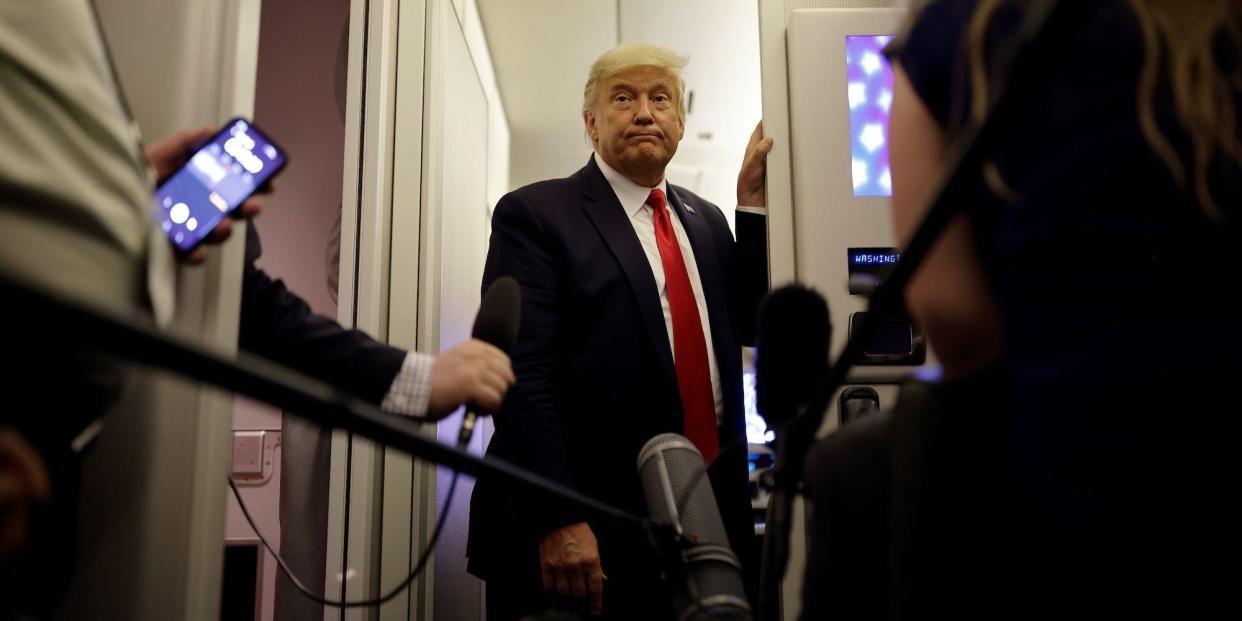'I'm not optimistic': Top Republican casts doubt on the huge stimulus deal Trump now says he wants

It appears unlikely that Congress will pass a new coronavirus relief package before Election Day, despite President Donald Trump's push for a sizable bill.
Trump on Tuesday signaled that he wanted an even larger deal than the $2.2 trillion bill proposed by House Democrats, but Republicans are throwing cold water on the prospect of enacting a deal soon.
"It's getting to be toward the last minute. And the clock keeps ticking away. And I'm not optimistic about us doing anything," Sen. Richard Shelby, the chairman of the Senate Appropriations Committee, told reporters on Tuesday.
The deadlock in Washington over a coronavirus stimulus deal seems poised to continue based on comments from a top Senate Republican.
"You never know what's going to happen around here at the last minute. But it's getting to be toward the last minute. And the clock keeps ticking away. And I'm not optimistic about us doing anything," Sen. Richard Shelby, the chairman of the Senate Appropriations Committee, told reporters on Tuesday.
President Donald Trump on Tuesday morning told "Fox & Friends" that he wanted a deal even bigger than the $2.2 trillion package proposed by House Speaker Nancy Pelosi, though his administration has already offered a deal under that price tag.
"I want to do it even bigger than the Democrats. And not every Republican agrees with me, but they will," Trump said.
But as Shelby signaled, Senate Republicans are not on the same page as the president. The GOP has prioritized confirming Judge Amy Coney Barrett to the Supreme Court over passing another economic relief bill ahead of Election Day. Senate Majority Leader Mitch McConnell has pushed for a far slimmer package than Democrats and the president have proposed.
McConnell on Tuesday was expected to hold a vote on a bill to provide a $260 billion boost to the Paycheck Protection Program. The GOP leader on Wednesday is set to hold a vote on a $500 billion bill that Democrats have bashed and that is unlikely to reach the president's desk.
—The Recount (@therecount) October 20, 2020
Democrats and Republicans have for months been at an impasse over a new economic relief package.
Trump earlier this month offered a $1.8 trillion deal to Democrats that Senate Republicans said was too much and Pelosi said was too little. Before that, on October 6, he called for scrapping stimulus talks altogether, then reversed course hours later.
But Pelosi has expressed optimism about a deal as she negotiates with Treasury Secretary Steven Mnuchin. The House speaker on Sunday set a Tuesday deadline for a deal on a multitrillion-dollar relief package. On Tuesday, she told Bloomberg that she and Mnuchin were "on a path" to a deal.
"We could still continue the negotiation. It might not be finished by Election Day," Pelosi said.
McConnell on Tuesday told reporters that the Senate would "consider" a deal reached by the Trump administration and Pelosi. He also said that if the House were to pass a bill supported by the president, he would bring it to the Senate floor "at some point," though he didn't specify whether a vote would take place before the election.
The Republican leader said the Senate would hold a vote on Barrett's confirmation on Monday. With a 53-47 Republican majority in the Senate, Barrett is expected to be confirmed.
The coronavirus pandemic triggered an economic recession in the US that continues to weigh heavily on millions of Americans, particularly those with lower incomes. People across the US have said they've struggled to pay rent and cover other bills in recent months.
Roughly 22 million jobs were lost from February to April. Though nearly half of those jobs have been recovered, many Americans are still out of work.
The unemployment rate in September stood at 7.9%, estimated to be about 12 million people. In February, the unemployment rate was 3.4%.
Meanwhile, Trump has not signed a coronavirus relief bill in roughly six months, and expanded unemployment benefits provided via the historic relief legislation enacted in late March have expired.
Read the original article on Business Insider


